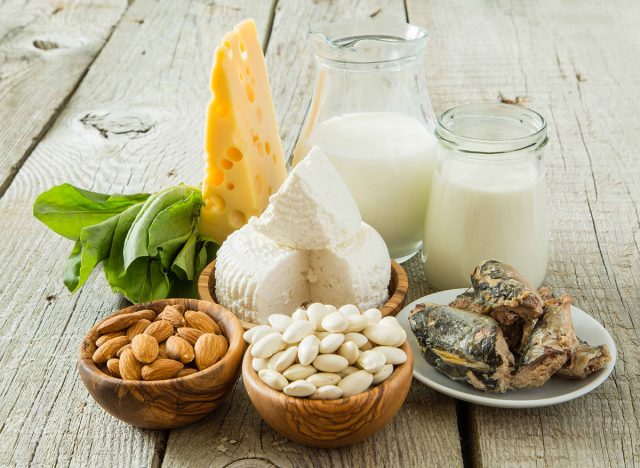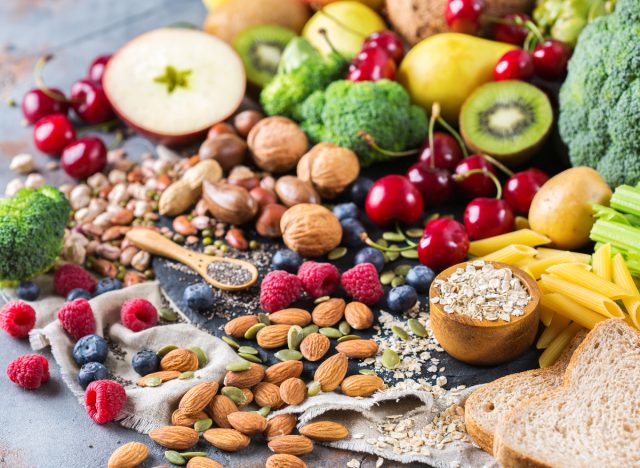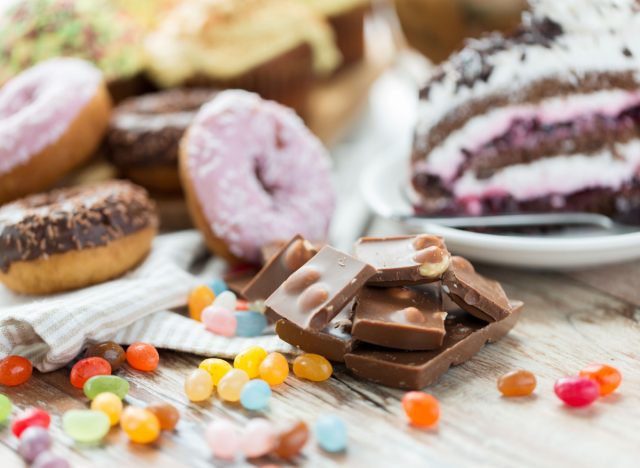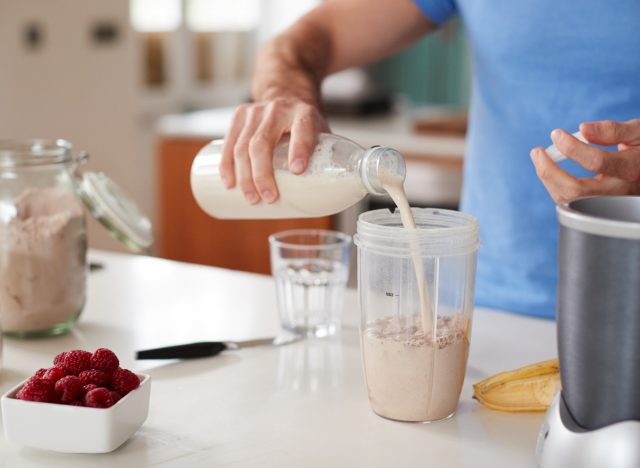5 Eating Habits Destroying Your Body After 30

Your 30s can be a time for flourishing. You're more established, confident, and sure of yourself than you were in your 20s. Hopefully, you're also still feeling healthy and lively enough to do everything you need to be independent in terms of your self-care without worrying too much about coping with any chronic and/or egregious medical challenges. Even though many changes in your body's health really start to occur in your 40s, 50s, and 60s, the decade of your 30s is an important time to start setting healthy habits and get into the routine of taking care of yourself, including eating a well-balanced, wholesome diet. In fact, experts and research studies say that if you're not careful, certain eating habits could possibly destroy your body in your 30s.
How your body & health change in your 30s

Let's face it: Your body just isn't the same in your 30s as it was in your 20s. One common misconception is that your metabolism slows down. But regardless of what many people believe, your metabolism doesn't actually significantly slow down until your 60s. However, there are still many ways you'll experience natural changes in your body and health as you live through this decade. According to the National Institute of Health, some common ways you'll experience changes after 30 are:
- Bone health: Beyond the age of 30, your bones will begin to lose minerals and density.
- Muscle tissue: Over time, your body begins to lose lean muscle tissue, and this process begins after 30.
- Body fat: Your body fat increases with age as well, and your risk of abdominal fat specifically increases as well.
New research has also shown that having high blood pressure in your 30s may be linked to worsened brain health in later adulthood. A study published in JAMA revealed that those with hypertension (high blood pressure) between the ages of 30 and 40 had less brain volume and white matter in their later years, which can lead to dementia and other neurodegenerative complications. This means that research supports the idea that not only are your bones, muscles, and body fat changing in your 30s, but your heart health in this decade may impact your health for decades to come.
Along with these changes, experts also say that females who enter into their 30s should be thinking about perimenopause—which is when the body starts transitioning into menopause.
"When a female enters her 30s, perimenopause and menopause may be the last two things on her mind, but if she is blessed to live a long life and her ovaries have never been removed, she will more than likely experience a hormonal shift in her 40s or early 50s," says Lauren Manaker, MS, RDN. "Not taking a proactive approach to support bone health, heart health, and other factors that can be impacted by the natural dip in estrogen that occurs during perimenopause can result in experiencing some unsavory side effects."
You may be thinking that your 30s are too early of a time to start preparing for something that occurs in your 40s and 50s, but Manaker argues that it's best to get healthy habits in order now, so that your body and health can be prepared for the future.
"Perimenopause is around the corner, and we need to enter that phase on the right foot. So trying to eat foods that support heart health, bone health, etc., is important in your 30s, as it's going to be harder to maintain those things as you enter menopause," she says. And hopefully then, we can "enter this stage with strong bones, a healthy heart, and a weight that is not considered to be obese."
RELATED: The Best Snacks for Bone Health, According to a Dietitian
How your eating habits can impact your health after 30

With all of these important health factors to think about after turning 30—such as loss of bone density and muscle tissue, changes in body fat, and the importance of maintaining a healthy heart—one major area of focus to consider is your diet.
For starters, getting enough nutrients in your daily diet can be a crucial way to maintain the health of your bones and muscles as they age. Also, consuming enough fiber and healthy fats is a great way to pursue a healthy heart. And when it comes to watching your levels of body fat in your 30s, focusing on how much sugar and alcohol you're consuming regularly can make a significant difference.
Read on to learn more about how diet can impact your health in your 30s with these eating habits that dietitians say can wreak havoc on your body.
Eating habits destroying your body in your 30s
You're not getting enough calcium or vitamin D

As we mentioned previously, your bones begin to lose density in your 30s. One way to help slow this process down and maintain the strength of your bones is to make sure you're getting bone-supporting nutrients in your diet, such as calcium and vitamin D. Your body needs calcium for bone strength and development, and vitamin D provides similar functions while also having a protective effect on fractures and inflammation.
"Inadequate calcium and vitamin D consumption can reduce bone density, raising the risk of osteoporosis and fractures," says Katherine Gomez, RD, registered dietitian and medical reviewer at PsycheMag. "Because of this, it is critical to consume calcium-rich foods such as dairy products, leafy greens, and fortified meals, as well as obtain adequate sunshine or take vitamin D supplements."
Manaker adds that "bone health can be supported by eating foods like prunes and dairy milk."
Dairy products are rich sources of calcium, and if you look for milk that is fortified with vitamin D, you'll gift your bones with an extra boost. Additionally, a study published in the American Journal of Clinical Nutrition notes that eating prunes daily helped post-menopausal women maintain more bone mass than those who didn't eat the prunes. Being post-menopause is something that certainly occurs after your 30s, but this study proves there may be some bone-protecting benefits to eating prunes!
You've been skipping out on heart & gut-healthy foods

Because of the importance of maintaining a healthy heart at any age—but also as you enter your 30s—experts say you'll want to incorporate foods containing heart-healthy nutrients.
"Focusing on whole grains, 'good' fats, fruits, vegetables, and oily, coldwater fish can help support heart health, and taking a proactive approach to supporting your heart before reaching the menopausal years is a wise idea," says Manaker.
When it comes to specific nutrients that are helpful to your heart, fiber is a major one. It can reduce cholesterol, lower blood pressure, and help manage inflammation in the body. Along with helping your heart, fiber is also a crucial nutrient for gut health, too.
"Not eating enough dietary fiber in your thirties, and in particular, the soluble type of dietary fiber that acts as a prebiotic and nourishes your gut, negatively impacts your body's inflammatory pathways, digestion, and mood," says Kara Landau, RD, at Gut Feeling Consultancy and nutrition advisor to the Global Prebiotic Association. "Seeking out a range of prebiotic-rich plant-based foods such as kiwi, Jerusalem artichokes (sometimes called sunchokes), roasted and then cooled potatoes, oats, less ripe bananas, legumes, and nuts are all great ways to boost your prebiotic fiber intake, and ultimately support your health in your 30s."
You are consuming too much added sugar

Everyone deserves a sweet treat whenever they feel like one, but monitoring how much sugar you consume on a regular basis can help you manage your weight and blood sugar in your 30s. This can be especially helpful because of the extra fat stored in our bodies during this decade.
"Consuming high-glycemic index carbohydrates in your thirties causes your blood sugar levels to constantly spike, resulting in excess insulin being required to help move the glucose from your blood, and as a result can be associated with excess fat storage," says Landau. "Switching to lower-glycemic index carbohydrates, as well as selecting carbohydrates that contain a particular type of prebiotic called resistant starch, can help support both better blood sugar level regulation and assist your cells to be more responsive to insulin, which together can support keeping you lean and preventing any negative metabolic effects as you age."
High-glycemic carbohydrates include foods like white bread, baked goods with refined sugar, most store-bought breads, and crackers, sugary cereals, etc. Lower-glycemic index foods include brown rice, steel-cut oats, leafy greens, and whole-grain bread. Foods with resistant starch include beans, legumes, whole grains, potatoes, and green bananas.
You binge drink & party as hard as you did in your 20s

Moderate consumption of alcohol is perfectly fine, but you may want to leave your days of college binge drinking behind in your 20s.
"Consuming excessive alcohol has been associated with weight gain, cardiovascular disease, and other metabolic disorders," says Carmelita Lombera, RDN. If you're wondering what excessive alcohol means, "Binge drinking is defined as having more than four drinks for women and more than five drinks for men," adds Lombera.
You're not getting enough protein

Because your muscle tissue changes starting in your 30s, it's important to eat foods that are high in muscle-building nutrients—like protein.
"Not getting enough protein each day to maintain your muscle mass—which starts to break down in your 30s—is essential if you want to keep your metabolism firing," says Landau. "Ensuring you incorporate a protein-rich source at each meal, such as Greek yogurt, legumes and lentils, eggs, cottage cheese, tofu, fish, or lean meats and poultry, are all ways of bumping up your protein intake and ensuring you stay both satiated and nourished to maintain muscle mass in this decade."
- Source: https://www.science.org/doi/10.1126/science.abe5017/
- Source: https://medlineplus.gov/ency/article/003998.htm/
- Source: https://jamanetwork.com/journals/jamanetworkopen/fullarticle/2802984/
- Source: https://www.mayoclinic.org/diseases-conditions/perimenopause/symptoms-causes/syc-20354666/
- Source: https://www.ncbi.nlm.nih.gov/pmc/articles/PMC6316542/
- Source: https://www.ncbi.nlm.nih.gov/pmc/articles/PMC3257679/
- Source: https://www.sciencedirect.com/science/article/abs/pii/S0002916523036092?via%3Dihub/
- Source: https://www.mayoclinic.org/healthy-lifestyle/nutrition-and-healthy-eating/in-depth/fiber/art-20043983#:~:text=Soluble%20fiber%20found%20in%20beans,reducing%20blood%20pressure%20and%20inflammation./
- Source: https://www.health.harvard.edu/healthbeat/a-good-guide-to-good-carbs-the-glycemic-index/
- Source: https://www.ncbi.nlm.nih.gov/pmc/articles/PMC5522652/
- Source: https://www.ncbi.nlm.nih.gov/pmc/articles/PMC5513687/
- Source: https://www.niaaa.nih.gov/alcohol-health/overview-alcohol-consumption/moderate-binge-drinking#:~:text=NIAAA%20defines%20heavy%20drinking%20as,than%207%20drinks%20per%20week/









